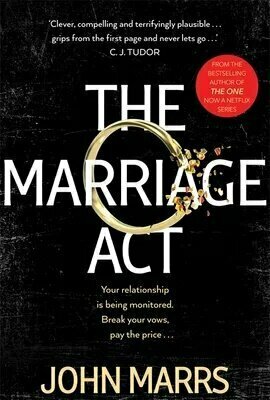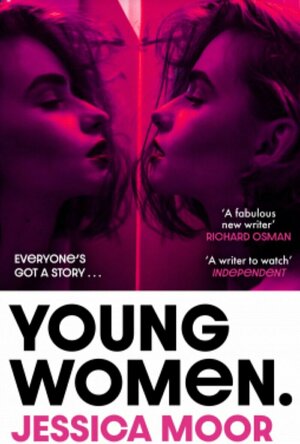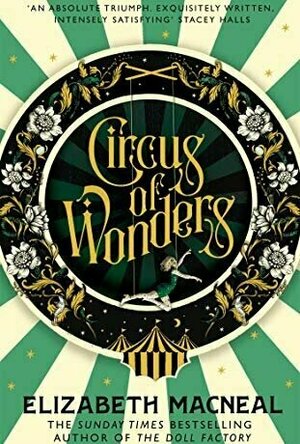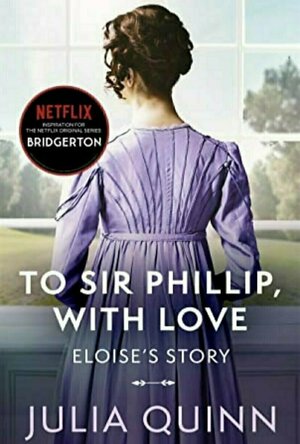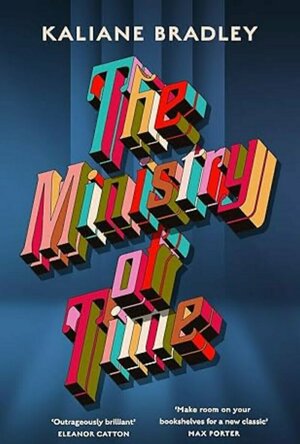Search
Search results
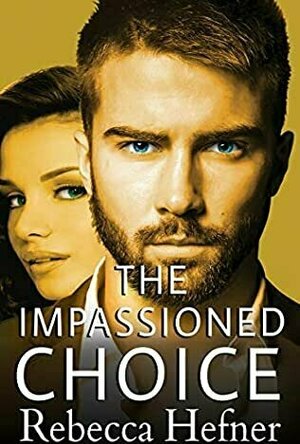
The Impassioned Choice (Etherya's Earth #5)
Book
A new villain emerges, threatening the peace the immortals crave… Heden, the youngest Vampyre...
Fantasy Romance Vampires
Hazel (2934 KP) rated The Marriage Act in Books
Jan 22, 2023
Set in a time not too far away, this is a dark and rather creepy tale that I thoroughly enjoyed.
Would you 'upgrade' your marriage if it meant getting preferential treatment ... the best jobs, the best houses, better health care, education, etc., etc., etc.? But then what if that meant artificial intelligence was listening in to snap shots of your conversations and then analysing them to make sure you are keeping to the terms of your marriage? And if not, a scale of interventions would be put into action. Would you still do it? Well, The Marriage Act will probably make you think again!
Mr Marrs certainly gets you thinking and poses really interesting questions and dilemmas in this well plotted, perfectly paced book told from the viewpoints of his well created characters and with some great twists and turns.
Thoroughly enjoyable and quite an unsettling book that actually doesn't feel that far from becoming a reality! How many have an Alexa, Siri or similar digital voice assistant in the home or on your wrist that just sits there? I'm not a conspiracy theorist, however I imagine it wouldn't take much for a law to be passed in the name of improving the economy or society in some way, then a switch is flicked and the process would start ... definitely not beyond the realms of reality and very scary!
This is the second of Mr Marrs' books I have enjoyed and I will definitely read more in the future and thanks must go to Pan Macmillan, Macmillan and NetGalley for enabling me to read and share my thoughts of The Marriage Act.
Would you 'upgrade' your marriage if it meant getting preferential treatment ... the best jobs, the best houses, better health care, education, etc., etc., etc.? But then what if that meant artificial intelligence was listening in to snap shots of your conversations and then analysing them to make sure you are keeping to the terms of your marriage? And if not, a scale of interventions would be put into action. Would you still do it? Well, The Marriage Act will probably make you think again!
Mr Marrs certainly gets you thinking and poses really interesting questions and dilemmas in this well plotted, perfectly paced book told from the viewpoints of his well created characters and with some great twists and turns.
Thoroughly enjoyable and quite an unsettling book that actually doesn't feel that far from becoming a reality! How many have an Alexa, Siri or similar digital voice assistant in the home or on your wrist that just sits there? I'm not a conspiracy theorist, however I imagine it wouldn't take much for a law to be passed in the name of improving the economy or society in some way, then a switch is flicked and the process would start ... definitely not beyond the realms of reality and very scary!
This is the second of Mr Marrs' books I have enjoyed and I will definitely read more in the future and thanks must go to Pan Macmillan, Macmillan and NetGalley for enabling me to read and share my thoughts of The Marriage Act.
ClareR (6079 KP) rated Young Women in Books
Apr 12, 2023
Young Women is set against the #MeToo era. It’s a fascinating read, and it was interesting to take a look into the lives of Emily and her friend Tamsin.
Emily meets Tamsin at a protest march and they become friends very quickly. Tamsin is an actress who seems to be living a very expensive life. She owns a flat in Soho, eats in expensive restaurants and drinks in even more expensive bars. In contrast, Emily shares a small flat, and works for a charity that deals with women’s advocacy. Her life is very different, and she’s excited by what Tamsin has to offer.
When an actress comes forward to accuse a film director of sexual assault, Emily realises that Tamsin is involved in some way.
This novel looks at how women can be coerced into keeping quiet about assault and in this case, with large sums of money. We see how men have all the power, how acts of sexual assault by males are all too frequent and commonplace, and how women can make themselves complicit whilst experiencing trauma.
There’s a lot to talk about in this novel, and I think it would make an outstanding book club book. It would certainly create a great deal of discussion around both sides of the equation. All of the men are written as complication inappropriate behaviours around women, and the women initially take the money in exchange for their silence, only to disclose what happened to them later.
This is a brilliant book, I hope people will read it and discuss the questions it raises about our society as a whole.
Emily meets Tamsin at a protest march and they become friends very quickly. Tamsin is an actress who seems to be living a very expensive life. She owns a flat in Soho, eats in expensive restaurants and drinks in even more expensive bars. In contrast, Emily shares a small flat, and works for a charity that deals with women’s advocacy. Her life is very different, and she’s excited by what Tamsin has to offer.
When an actress comes forward to accuse a film director of sexual assault, Emily realises that Tamsin is involved in some way.
This novel looks at how women can be coerced into keeping quiet about assault and in this case, with large sums of money. We see how men have all the power, how acts of sexual assault by males are all too frequent and commonplace, and how women can make themselves complicit whilst experiencing trauma.
There’s a lot to talk about in this novel, and I think it would make an outstanding book club book. It would certainly create a great deal of discussion around both sides of the equation. All of the men are written as complication inappropriate behaviours around women, and the women initially take the money in exchange for their silence, only to disclose what happened to them later.
This is a brilliant book, I hope people will read it and discuss the questions it raises about our society as a whole.

Gwenna The Welsh Confectioner (The New Zealand Immigrant Collection) by Vicky Adin
Book
Against overwhelming odds, can she save her legacy? Gwenna's life is about to change. Her father is...
Historical Fiction Women's Fiction New Zealand Family Saga
ClareR (6079 KP) rated Circus of Wonders in Books
Mar 15, 2022
After reading The Doll Factory, I was on the look out for Elizabeth Macneal’s next book. Circus of Wonders has NOT disappointed me.
Elizabeth Macneal has described what it is like to be on the margins of society - an outcast because you don’t look the same as everyone else. Nell lives in a time where you are shunned for having birthmarks such as hers. She is considered to be bad luck, a curse. Not helped by the fact that her mother had died in childbirth. Her father constantly reinforces this, and won’t even touch her. Nell’s beloved brother is her sole comfort. He cares for her, and promises to take her with him when he marries.
But Nell’s father sells her to Jasper Jupiters Circus of Wonders. Jasper is a man who is hellbent on being a success, and thinks nothing of using Nell and others like her, to achieve greatness. Jasper and his brother Toby, are both survivors of the Crimean war, and clearly carry many secrets.
Themes such as exploitation, ownership, differences, power, sibling love, secrets, love and loss are central to this book.
Nell is a constant surprise. She goes from being a scared, vulnerable girl, to becoming the centre of attention, in control of all those who come to watch her. This is the other side to the P. T. Barnum story. We’ve probably all heard of ‘The Greatest Showman’, but there’s the other exploitative side that seems to have been brushed under the carpet. This book shows that side.
I loved this book, and I wouldn’t hesitate to tell you all to go out and buy it!
Elizabeth Macneal has described what it is like to be on the margins of society - an outcast because you don’t look the same as everyone else. Nell lives in a time where you are shunned for having birthmarks such as hers. She is considered to be bad luck, a curse. Not helped by the fact that her mother had died in childbirth. Her father constantly reinforces this, and won’t even touch her. Nell’s beloved brother is her sole comfort. He cares for her, and promises to take her with him when he marries.
But Nell’s father sells her to Jasper Jupiters Circus of Wonders. Jasper is a man who is hellbent on being a success, and thinks nothing of using Nell and others like her, to achieve greatness. Jasper and his brother Toby, are both survivors of the Crimean war, and clearly carry many secrets.
Themes such as exploitation, ownership, differences, power, sibling love, secrets, love and loss are central to this book.
Nell is a constant surprise. She goes from being a scared, vulnerable girl, to becoming the centre of attention, in control of all those who come to watch her. This is the other side to the P. T. Barnum story. We’ve probably all heard of ‘The Greatest Showman’, but there’s the other exploitative side that seems to have been brushed under the carpet. This book shows that side.
I loved this book, and I wouldn’t hesitate to tell you all to go out and buy it!
Laura Doe (1350 KP) rated To Sir Phillip, With Love (Bridgertons, #5) in Books
Jan 8, 2022
The Bridgerton stories just get better and better. This one has definitely been my favourite so far, but I think that might be because Eloise was my favourite female Bridgerton anyway.
I wondered how Julia Quinn was planning on replacing the Lady Whistledown’s Society Paper excerpts at the start of the chapters after she retired, but having excerpts from Eloise’s letters seemed like the perfect replacement throughout this book. It really gave an insight into Eloise’s thoughts at each of the important points in her life when she was writing to someone she loved.
As much as it was difficult to read about Phillip and his struggles to control his temper, it was very well done and knowing the background behind his temper helped to understand his character too. I was glad that from the moment Eloise entered his life he tried to be a better father to his children and also appeared a lot calmer than he was at first. This is the opposite to the previous books where most of the men seems to become angry quite quickly at their future wives as they’re “infuriating” before it quickly turns into love. So it was quite nice to have it a different way where he didn’t frequently fly into a rage over something that his wife had said.
I think the Bridgerton books are very clever, as they don’t give too much away about each sibling, making you want to read the next book to learn more about them and not just the snippets that you see of them in each book. I will be starting the next book asap!
I wondered how Julia Quinn was planning on replacing the Lady Whistledown’s Society Paper excerpts at the start of the chapters after she retired, but having excerpts from Eloise’s letters seemed like the perfect replacement throughout this book. It really gave an insight into Eloise’s thoughts at each of the important points in her life when she was writing to someone she loved.
As much as it was difficult to read about Phillip and his struggles to control his temper, it was very well done and knowing the background behind his temper helped to understand his character too. I was glad that from the moment Eloise entered his life he tried to be a better father to his children and also appeared a lot calmer than he was at first. This is the opposite to the previous books where most of the men seems to become angry quite quickly at their future wives as they’re “infuriating” before it quickly turns into love. So it was quite nice to have it a different way where he didn’t frequently fly into a rage over something that his wife had said.
I think the Bridgerton books are very clever, as they don’t give too much away about each sibling, making you want to read the next book to learn more about them and not just the snippets that you see of them in each book. I will be starting the next book asap!
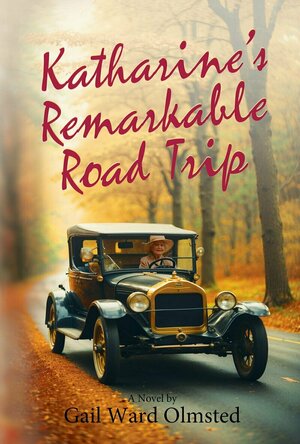
Katharine's Remarkable Road Trip
Book
In the fall of 1907, Katharine decides to drive from Newport, Rhode Island, to her home in Jackson,...
Historical Fiction Civil War Nurses Biographical Fiction Women In History
ClareR (6079 KP) rated The Ministry of Time in Books
Jun 4, 2024
This book is everything I love about reading. I read to escape (mainly, but not solely!), and so science fiction/ fantasy has always appealed to me. Now I’ve discovered speculative fiction, and it seems to be like both of these things wrapped up in a package with a label saying: “This Seems Plausible”.
The Ministry of Time is a clever book - it uses time travel and science fiction, with a touch of history that actually happened, and mixes it up with a hefty dose of romance, thriller and literary fiction. It doesn’t sound like it will work, but I’m here to say that it really DOES!
Ok, so a quick, yet vague, synopsis: the British Government has come into possession of a device that can go back in time and find particular people in the past. It’s been decided that the people they take are all in life-threatening situations. Those plucked from their time are placed with a “Bridge”; someone who will facilitate their integration into modern society.
The main pair is that of Graham Gore, a Polar explorer from the Erebus expedition, and his Bridge, a woman whose mother escaped the Khmer Rouge in Cambodia. Not an easy adjustment for a Victorian man. This Bridge is the narrator.
Graham Gore adjusts quickly to modern life, but is modern life willing to accept him? And what affect does it have on him and his fellow time travellers, to be so out of time?
There was so much to think about whilst reading this - I was completely immersed, and it ended FAR too quickly!
The Ministry of Time is a clever book - it uses time travel and science fiction, with a touch of history that actually happened, and mixes it up with a hefty dose of romance, thriller and literary fiction. It doesn’t sound like it will work, but I’m here to say that it really DOES!
Ok, so a quick, yet vague, synopsis: the British Government has come into possession of a device that can go back in time and find particular people in the past. It’s been decided that the people they take are all in life-threatening situations. Those plucked from their time are placed with a “Bridge”; someone who will facilitate their integration into modern society.
The main pair is that of Graham Gore, a Polar explorer from the Erebus expedition, and his Bridge, a woman whose mother escaped the Khmer Rouge in Cambodia. Not an easy adjustment for a Victorian man. This Bridge is the narrator.
Graham Gore adjusts quickly to modern life, but is modern life willing to accept him? And what affect does it have on him and his fellow time travellers, to be so out of time?
There was so much to think about whilst reading this - I was completely immersed, and it ended FAR too quickly!
Hazel (1853 KP) rated Small Great Things in Books
May 24, 2017
Small is an Understatement
Jodi Picoult has been my favourite author since I first came across her novels in 2008. With twenty-three novels under her belt, she continues to delight readers with her page-turning stories. Most of Picoult’s books contain a moral issue, often, but not always, in the form of medical ethics, as well as a hefty court case. Although following along similar lines, Small Great Things is a radical, revolutionary book, which, with great courage, Picoult has written with the intent to expose the reader to truths that most of us, as a society, are intentionally oblivious to.
The gist of the storyline is that a baby dies whilst under the care of a nurse, prompting the grieving parents to take her to court with the accusation of murder. Although that sounds like an interesting story, it barely begins to describe what the book is about. The character on trial, Ruth, is an African American labour and delivery nurse – something that in this day and age need not by an issue. On the other hand, the parents of the baby are White Supremacists: seriously racist with the belief that white people are the master race. The father, Turk, refuses to let his wife and child be treated by Ruth, however circumstances result in her being the only nurse available to watch Davis, when, unfortunately, he so happens to go into cardiac arrest. Although the reader knows that Ruth is not at fault, Turk insists she murdered his child – but is he accusing her of medical negligence, or punishing her for being black?
Three characters, all with different views and experience when it comes to racism, alternately narrate Small Great Things. Ruth and Turk represent the extremes at either side of the scale. Ruth experiences first hand the negative impact of prejudice in the American system and society, not only through this court case, but in everyday life as well. She also reveals the difficulties growing up in a predominately white environment, never feeling like she fitted in with her peers. Alternatively, Turk spent his teenage years attending KKK rallies, participating in a white power movement, and beating up anyone who was different: black, foreign, gay, Jewish and so forth.
The third character represents the majority of white people living in America. Kennedy is a public defender and the lawyer assigned to Ruth’s case. Like most of the population, she believes that she is not racist, and persuades Ruth to leave the colour of her skin out of the argument. However, as she gets to know her client, she begins to realize that it is nigh on impossible to ignore racial prejudice.
Picoult shocks the reader on two accounts: one, the way that people of colour have been, and still are, treated; and two, the revelation that an invisible empire of White Supremacists are living amongst us. Yet there is a third way in which Picoult provokes outrage – she indirectly accuses the reader of being racist, too.
There is always something to learn in a Jodi Picoult novel, for instance medical terminology, or the way in which a court trial is conducted. Small Great Things provides a lot more eye opening information than any of her previous books, unveiling facts about such a controversial subject.
Through Kennedy, the reader’s eyes are opened to the racial discrimination that we all turn a blind eye to. Ignored are the difficulties African Americans suffer when going shopping, applying for jobs, attending school, walking down the street, sitting on a bus, and so forth. Picoult asks me as a reader to think about how my life has been affected by racial discrimination: being served politely in shops because I am white, not having my ethnicity questioned when applying for college etc. Living in Britain I have not experienced openly hateful comments or behaviours towards people with a different skin tone – I used to believe this was primarily an American problem. Yet, Small Great Things has really made me think about the hierarchy of power within society, particularly in regards to the ethnicity of those at the top, compared with those at the bottom.
Jodi Picoult sat on the idea of writing a book about racism for well over a decade, yet it is particularly apt that it is published now, with the current predicaments America is facing. Although we have come a long way in attempts to achieve equality for all – compare the trial in To Kill A Mockingbird to Picoult’s version – recent events have revealed that we are no where near.
Small Great Things will shock everyone who reads it regardless of their ethnicity and so forth. Many may find it uncomfortable to read, become upset or outraged, and even feel like they are being directly targeted. If this is the case, then good – it should do that. Everyone needs to read this book. On the one hand it is a brilliant, well told story with a beautiful, almost poetic narrative, and on the other, it causes us to face up to the issues we are forever making light of or overlooking entirely. We have grown up believing that racism is a form of hatred when, actually, it is about power. However Small Great Things makes you feel, it is definitely worth reading, especially for the satisfying ending – one that you do not see coming.
The gist of the storyline is that a baby dies whilst under the care of a nurse, prompting the grieving parents to take her to court with the accusation of murder. Although that sounds like an interesting story, it barely begins to describe what the book is about. The character on trial, Ruth, is an African American labour and delivery nurse – something that in this day and age need not by an issue. On the other hand, the parents of the baby are White Supremacists: seriously racist with the belief that white people are the master race. The father, Turk, refuses to let his wife and child be treated by Ruth, however circumstances result in her being the only nurse available to watch Davis, when, unfortunately, he so happens to go into cardiac arrest. Although the reader knows that Ruth is not at fault, Turk insists she murdered his child – but is he accusing her of medical negligence, or punishing her for being black?
Three characters, all with different views and experience when it comes to racism, alternately narrate Small Great Things. Ruth and Turk represent the extremes at either side of the scale. Ruth experiences first hand the negative impact of prejudice in the American system and society, not only through this court case, but in everyday life as well. She also reveals the difficulties growing up in a predominately white environment, never feeling like she fitted in with her peers. Alternatively, Turk spent his teenage years attending KKK rallies, participating in a white power movement, and beating up anyone who was different: black, foreign, gay, Jewish and so forth.
The third character represents the majority of white people living in America. Kennedy is a public defender and the lawyer assigned to Ruth’s case. Like most of the population, she believes that she is not racist, and persuades Ruth to leave the colour of her skin out of the argument. However, as she gets to know her client, she begins to realize that it is nigh on impossible to ignore racial prejudice.
Picoult shocks the reader on two accounts: one, the way that people of colour have been, and still are, treated; and two, the revelation that an invisible empire of White Supremacists are living amongst us. Yet there is a third way in which Picoult provokes outrage – she indirectly accuses the reader of being racist, too.
There is always something to learn in a Jodi Picoult novel, for instance medical terminology, or the way in which a court trial is conducted. Small Great Things provides a lot more eye opening information than any of her previous books, unveiling facts about such a controversial subject.
Through Kennedy, the reader’s eyes are opened to the racial discrimination that we all turn a blind eye to. Ignored are the difficulties African Americans suffer when going shopping, applying for jobs, attending school, walking down the street, sitting on a bus, and so forth. Picoult asks me as a reader to think about how my life has been affected by racial discrimination: being served politely in shops because I am white, not having my ethnicity questioned when applying for college etc. Living in Britain I have not experienced openly hateful comments or behaviours towards people with a different skin tone – I used to believe this was primarily an American problem. Yet, Small Great Things has really made me think about the hierarchy of power within society, particularly in regards to the ethnicity of those at the top, compared with those at the bottom.
Jodi Picoult sat on the idea of writing a book about racism for well over a decade, yet it is particularly apt that it is published now, with the current predicaments America is facing. Although we have come a long way in attempts to achieve equality for all – compare the trial in To Kill A Mockingbird to Picoult’s version – recent events have revealed that we are no where near.
Small Great Things will shock everyone who reads it regardless of their ethnicity and so forth. Many may find it uncomfortable to read, become upset or outraged, and even feel like they are being directly targeted. If this is the case, then good – it should do that. Everyone needs to read this book. On the one hand it is a brilliant, well told story with a beautiful, almost poetic narrative, and on the other, it causes us to face up to the issues we are forever making light of or overlooking entirely. We have grown up believing that racism is a form of hatred when, actually, it is about power. However Small Great Things makes you feel, it is definitely worth reading, especially for the satisfying ending – one that you do not see coming.
Hazel (1853 KP) rated Small Great Things in Books
Dec 7, 2018
Jodi Picoult has been my favourite author since I first came across her novels in 2008. With twenty-three novels under her belt, she continues to delight readers with her page-turning stories. Most of Picoult’s books contain a moral issue, often, but not always, in the form of medical ethics, as well as a hefty court case. Although following along similar lines, <i>Small Great Thing</i>s is a radical, revolutionary book, which, with great courage, Picoult has written with the intent to expose the reader to truths that most of us, as a society, are <s>intentionally</s> oblivious to.
The gist of the storyline is that a baby dies whilst under the care of a nurse, prompting the grieving parents to take her to court with the accusation of murder. Although that sounds like an interesting story, it barely begins to describe what the book is about. The character on trial, Ruth, is an African American labour and delivery nurse – something that in this day and age need not by an issue. On the other hand, the parents of the baby are White Supremacists: seriously racist with the belief that white people are the master race. The father, Turk, refuses to let his wife and child be treated by Ruth, however circumstances result in her being the only nurse available to watch Davis, when, unfortunately, he so happens to go into cardiac arrest. Although the reader knows that Ruth is not at fault, Turk insists she murdered his child – but is he accusing her of medical negligence, or punishing her for being black?
Three characters, all with different views and experience when it comes to racism, alternately narrate<i> Small Great Things</i>. Ruth and Turk represent the extremes at either side of the scale. Ruth experiences first hand the negative impact of prejudice in the American system and society, not only through this court case, but in everyday life as well. She also reveals the difficulties growing up in a predominately white environment, never feeling like she fitted in with her peers. Alternatively, Turk spent his teenage years attending KKK rallies, participating in a white power movement, and beating up anyone who was different: black, foreign, gay, Jewish and so forth.
The third character represents the majority of white people living in America. Kennedy is a public defender and the lawyer assigned to Ruth’s case. Like most of the population, she believes that she is not racist, and persuades Ruth to leave the colour of her skin out of the argument. However, as she gets to know her client, she begins to realize that it is nigh on impossible to ignore racial prejudice.
Picoult shocks the reader on two accounts: one, the way that people of colour have been, and still are, treated; and two, the revelation that an invisible empire of White Supremacists are living amongst us. Yet there is a third way in which Picoult provokes outrage – she indirectly accuses the reader of being racist, too.
There is always something to learn in a Jodi Picoult novel, for instance medical terminology, or the way in which a court trial is conducted. <i>Small Great Things</i> provides a lot more eye opening information than any of her previous books, unveiling facts about such a controversial subject.
Through Kennedy, the reader’s eyes are opened to the racial discrimination that we all turn a blind eye to. Ignored are the difficulties African Americans suffer when going shopping, applying for jobs, attending school, walking down the street, sitting on a bus, and so forth. Picoult asks me as a reader to think about how my life has been affected by racial discrimination: being served politely in shops because I am white, not having my ethnicity questioned when applying for college etc. Living in Britain I have not experienced openly hateful comments or behaviours towards people with a different skin tone – I used to believe this was primarily an American problem. Yet, <i>Small Great Things</i> has really made me think about the hierarchy of power within society, particularly in regards to the ethnicity of those at the top, compared with those at the bottom.
Jodi Picoult sat on the idea of writing a book about racism for well over a decade, yet it is particularly apt that it is published now, with the current predicaments America is facing. Although we have come a long way in attempts to achieve equality for all – compare the trial in <i>To Kill A Mockingbird</i> to Picoult’s version – recent events have revealed that we are no where near.
<i>Small Great Things</i> will shock everyone who reads it regardless of their ethnicity and so forth. Many may find it uncomfortable to read, become upset or outraged, and even feel like they are being directly targeted. If this is the case, then good – it should do that. Everyone needs to read this book. On the one hand it is a brilliant, well told story with a beautiful, almost poetic narrative, and on the other, it causes us to face up to the issues we are forever making light of or overlooking entirely. We have grown up believing that racism is a form of hatred when, actually, it is about power. However <i>Small Great Things </i>makes you feel, it is definitely worth reading, especially for the satisfying ending – one that you do not see coming.
The gist of the storyline is that a baby dies whilst under the care of a nurse, prompting the grieving parents to take her to court with the accusation of murder. Although that sounds like an interesting story, it barely begins to describe what the book is about. The character on trial, Ruth, is an African American labour and delivery nurse – something that in this day and age need not by an issue. On the other hand, the parents of the baby are White Supremacists: seriously racist with the belief that white people are the master race. The father, Turk, refuses to let his wife and child be treated by Ruth, however circumstances result in her being the only nurse available to watch Davis, when, unfortunately, he so happens to go into cardiac arrest. Although the reader knows that Ruth is not at fault, Turk insists she murdered his child – but is he accusing her of medical negligence, or punishing her for being black?
Three characters, all with different views and experience when it comes to racism, alternately narrate<i> Small Great Things</i>. Ruth and Turk represent the extremes at either side of the scale. Ruth experiences first hand the negative impact of prejudice in the American system and society, not only through this court case, but in everyday life as well. She also reveals the difficulties growing up in a predominately white environment, never feeling like she fitted in with her peers. Alternatively, Turk spent his teenage years attending KKK rallies, participating in a white power movement, and beating up anyone who was different: black, foreign, gay, Jewish and so forth.
The third character represents the majority of white people living in America. Kennedy is a public defender and the lawyer assigned to Ruth’s case. Like most of the population, she believes that she is not racist, and persuades Ruth to leave the colour of her skin out of the argument. However, as she gets to know her client, she begins to realize that it is nigh on impossible to ignore racial prejudice.
Picoult shocks the reader on two accounts: one, the way that people of colour have been, and still are, treated; and two, the revelation that an invisible empire of White Supremacists are living amongst us. Yet there is a third way in which Picoult provokes outrage – she indirectly accuses the reader of being racist, too.
There is always something to learn in a Jodi Picoult novel, for instance medical terminology, or the way in which a court trial is conducted. <i>Small Great Things</i> provides a lot more eye opening information than any of her previous books, unveiling facts about such a controversial subject.
Through Kennedy, the reader’s eyes are opened to the racial discrimination that we all turn a blind eye to. Ignored are the difficulties African Americans suffer when going shopping, applying for jobs, attending school, walking down the street, sitting on a bus, and so forth. Picoult asks me as a reader to think about how my life has been affected by racial discrimination: being served politely in shops because I am white, not having my ethnicity questioned when applying for college etc. Living in Britain I have not experienced openly hateful comments or behaviours towards people with a different skin tone – I used to believe this was primarily an American problem. Yet, <i>Small Great Things</i> has really made me think about the hierarchy of power within society, particularly in regards to the ethnicity of those at the top, compared with those at the bottom.
Jodi Picoult sat on the idea of writing a book about racism for well over a decade, yet it is particularly apt that it is published now, with the current predicaments America is facing. Although we have come a long way in attempts to achieve equality for all – compare the trial in <i>To Kill A Mockingbird</i> to Picoult’s version – recent events have revealed that we are no where near.
<i>Small Great Things</i> will shock everyone who reads it regardless of their ethnicity and so forth. Many may find it uncomfortable to read, become upset or outraged, and even feel like they are being directly targeted. If this is the case, then good – it should do that. Everyone needs to read this book. On the one hand it is a brilliant, well told story with a beautiful, almost poetic narrative, and on the other, it causes us to face up to the issues we are forever making light of or overlooking entirely. We have grown up believing that racism is a form of hatred when, actually, it is about power. However <i>Small Great Things </i>makes you feel, it is definitely worth reading, especially for the satisfying ending – one that you do not see coming.
